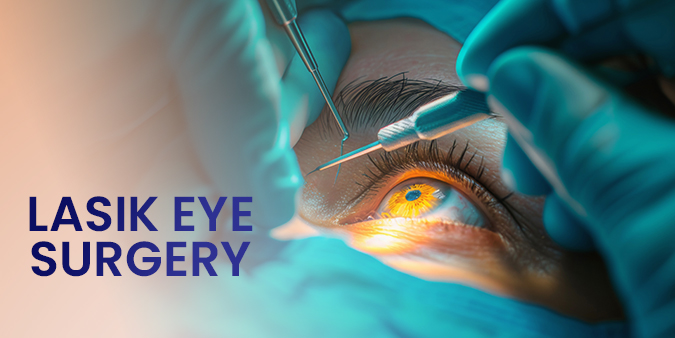
LASIK Eye Surgery: A Step-by-Step Guide to Better Vision
Wednesday, 22nd May 2024LASIK eye surgery has transformed the lives of millions by providing a solution to glasses and contact lenses. If you're considering this procedure, understanding each step can help you make an informed decision. This article provides a comprehensive, step-by-step guide to LASIK eye surgery, outlining everything from the initial consultation to post-operative care. Let's dive into the journey towards better vision.
What is LASIK Eye Surgery?
LASIK (Laser-Assisted In Situ Keratomileusis) is a popular refractive surgery designed to correct vision problems such as myopia (nearsightedness), hyperopia (farsightedness), and astigmatism. The surgery reshapes the cornea using a laser, allowing light to be properly focused onto the retina for clearer vision.
Step 1: Initial Consultation
- The first step in the LASIK process is an initial consultation with a qualified ophthalmologist. During this visit: Eye Examination: Your eye doctor will conduct a thorough eye exam to assess your vision and determine if you're a suitable candidate for LASIK.
- Medical History Review: A review of your medical history and any eye conditions will be conducted to ensure there are no contraindications.
- Discussion of Expectations: Your surgeon will discuss your vision goals and explain what LASIK can realistically achieve for you.
Step 2: Pre-Surgery Preparations
Pre-Surgery Instructions
Before your LASIK surgery, you will receive specific instructions, including:
- Avoid Contact Lenses: Stop wearing contact lenses for a specified period before the surgery, as they can alter the shape of your cornea.
- No Makeup or Creams: Avoid applying makeup, lotions, or creams around your eyes on the day of the surgery.
- Arrange Transportation: Ensure you have someone to drive you home after the procedure, as your vision will be blurry initially.
Step 3: The LASIK Procedure
On the Day of Surgery
When you arrive for your LASIK surgery, the following steps will take place:
- Preparation: You'll be given numbing eye drops to ensure comfort during the procedure. You may also receive a mild sedative to help you relax.
- Creating the Corneal Flap: Using a microkeratome or femtosecond laser, your surgeon will create a thin flap on the cornea. This flap is then gently lifted to expose the underlying corneal tissue.
- Reshaping the Cornea: An excimer laser is used to reshape the cornea by removing precise amounts of tissue. This step corrects the refractive error in your vision.
- Repositioning the Flap: After reshaping, the corneal flap is repositioned. It naturally adheres without the need for stitches.
Step 4: Immediate Post-Surgery Care
Right After Surgery
Once the surgery is complete:
- Rest in the Clinic: You'll rest for a short period at the clinic while your surgeon monitors your initial recovery.
- Protective Shields: You'll be given protective eye shields to wear, especially while sleeping, to prevent accidental rubbing of your eyes.
Step 5: The Recovery Process
First 24 Hours
The first 24 hours post-surgery are crucial for recovery:
- Rest Your Eyes: Avoid reading, watching TV, or using digital devices.
- Use Prescribed Eye Drops: Follow the instructions for antibiotic and anti-inflammatory eye drops to prevent infection and reduce inflammation.
- Avoid Rubbing Your Eyes: Rubbing your eyes can disrupt the healing process and dislodge the corneal flap.
First Week
During the first week:
- Attend Follow-Up Appointments: Your surgeon will check your eyes to ensure they're healing properly.
- Limit Screen Time: Minimize exposure to screens and bright lights to avoid eye strain.
- Avoid Water Exposure: Keep your eyes away from water sources like pools, hot tubs, and even direct shower spray to prevent infection.
Step 6: Long-Term Care and Vision Maintenance
Ongoing Care
To maintain your vision and eye health:
- Wear Sunglasses: Protect your eyes from harmful UV rays by wearing sunglasses outdoors.
- Stay Hydrated: Drink plenty of water to keep your eyes hydrated.
- Healthy Diet: Consume a balanced diet rich in vitamins A, C, and E, which support eye health.
- Regular Eye Exams: Continue with routine eye exams to monitor your eye health and ensure long-term success of the surgery.
Conclusion
LASIK eye surgery is a safe and effective way to achieve better vision, offering freedom from glasses and contact lenses. By understanding each step of the process, from the initial consultation to long-term care, you can make an informed decision and approach the procedure with confidence. Always consult with a qualified ophthalmologist to determine if LASIK is right for you and take the first step towards a clearer, brighter future


